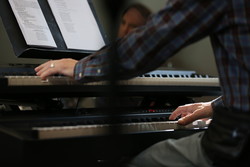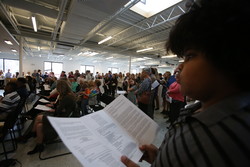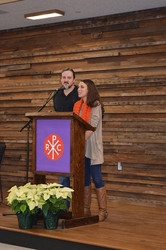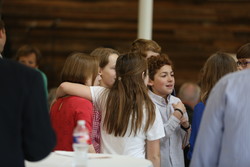
Our Worship
Worship is the central task of the Christian church. But what is worship? Tim Keller defines worship as seeing the worth of God and giving God what he is worth.
In all Christian traditions, formal or informal, two ideas shape worship, namely:
- Receiving from God. As we hear the word preached and are nourished by the sacraments we receive God’s grace and see anew His worth.
- Giving to God. We give him our worth -- sins (confession), our substance (offering), our praise (singing, other responses), our needs (prayers of the people). our problems (trusting his mercy), our devotion (recognizing and repudiating our idols), our thanks (eschewing self-pity).
Because we were created for worship, when we do not worship God, we worship other things (relationships, careers, money, accomplishments, approval, comfort, power, or control). To put anything in place of God for meaning, worth, value, and comfort is called idolatry. True worship is both a reminder of and remedy for our idolatry.
Redeemer’s Worship Style:
Redeemer intends its worship to be Ancient, yet Authentic - Liturgical, yet Soulful!
Strong gospel preaching combined with excellent music ground us and elevate God. The use of “the church calendar “ (traditionally celebrated events like Lent, Advent, Epiphany) connects us to the experience of believers throughout the ages.
The weekly communion powerfully displays our need of and Christ’s supply of His grace. Our worship is meant to be “sinner sensitive,” intelligible to the seeker/unbeliever, yet deeply edifying for the believer. We hope our services feel weighty and warm, challenging and comforting, enriching and inviting.
Redeemer’s Liturgy:
Our regular Sunday liturgy follows a four-fold pattern found in Scripture and the early church. God gathers us together, God feeds us with his Word and Sacrament and God sends us out to serve him in the world.
Gathering
Greeting & Call to Worship
Confession of Sin, Declaration of Forgiveness
The Word
Scripture reading/Sermon
Testimonies
The Eucharist/Lord’s Supper
Invitation to the Table
The Great Thanksgiving Prayer
The Words of Institution
Personal reception of the elements
Prayer after Communion
Sending
Charge
Benediction
Why does Redeemer use so many Written Prayers and Responses in Corporate Worship?
This is the one of the most frequently asked questions we receive from those who come to Redeemer, most often, from broadly evangelical churches. Many evangelical churches highly value “authenticity,” usually meaning a free-form spontaneity in prayer and emotive worship leading. Though all of these churches sing previously written song-lyrics in worship, the idea of praying previously written words together in corporate worship often seems too formal or “high church.” Likewise, many express the same dis-ease with corporately reciting written responses such as affirmations of faith (the Apostle’s Creed) or calls to worship.
We believe there are two advantages to using written corporate prayers and forms in worship, namely, participation and expression / formation.
Participation.
In many evangelical worship traditions the primary “pray-er” in the service is the pastor. He is the only one who ‘does’ anything. Written corporate prayers and responses helpfully require participation from the entire congregation; all present are invited to join in “with one voice” in engaging the living God.
Expression and Formation.
Evangelical worship is based on the assumption that what we are primarily supposed to do in worship is express what is in our hearts to God. This is biblical and should always be a part of our worship. But the kind of expression allowed in many evangelical churches is very one-sided consisting almost entirely of positive spiritual expressions of faith, hope, joy, love, and delight. However, it only takes a brief look at the Psalms or the prayers of Jesus to realize that God wants us to express the full range of our human emotions to him in prayer and worship; the positive as well as the difficult.
If our worship doesn’t allow us to lament our sin, the world’s brokenness, to grieve, etc., our worship can begin to feel fake, dishonest and un-real. During difficult times, we need forms of worship and prayer that express honestly what’s in our hearts.
Another problem with worship that is only expressive of what’s inside the believer is that it ignores a primary function of worship. Worship is not just ‘inside-out’; it is also ‘outside-in.’ It is not just expressive; it is to be formative. And this truth is very important. For it doesn’t take much experience as a believer to realize that much of what is in our hearts towards God is wrong and distorted by sin. Even when our hearts are not as actively hostile to God they are flat, cold, lifeless. We need ways of worship and prayer that shape or form what’s in our hearts. For, while it’s certainly true that belief produces action, action also helps strengthen belief; the ancient formula “the law of prayer is the law of belief” captures this truth well. In other words, one of the ways God has given us to shape what we believe, feel and do is formative worship.
For these reasons Redeemer uses written prayers and responses in our worship. Since we also use extemporaneous prayers and allow for times of silent private prayer and response to God, we hope that our practice reflects a biblical balance and leads to a holistic worship experience for the believer.
Marva Dawn, A Royal Waste of Time
The community gathers in worship to hear our story in the exhortations and challenges of our priests and prophets, in the retelling of the narratives of God’s word and works, in the singing of Christianity’s new and old exalted hymns of faith, in the remembering of our great creeds and doctrines, and in the prayers for God’s faithfulness and ours in response. The Christian community also listens together for the Holy Spirit’s guidance for our improvisation Act VI (i.e. this present era of the history of Christ’s church in which we are living). Then we go out from our gatherings to bring the story we have learned to the world around us. In the Christian community, people left homeless by the postmodern ethos can find a home. In the community’s meta-narrative, those left to wander in the postmodern condition can find true roots and a story that embraces them. Most of all, in the community and the community’s meta-narrative; the godless can find the true God.









